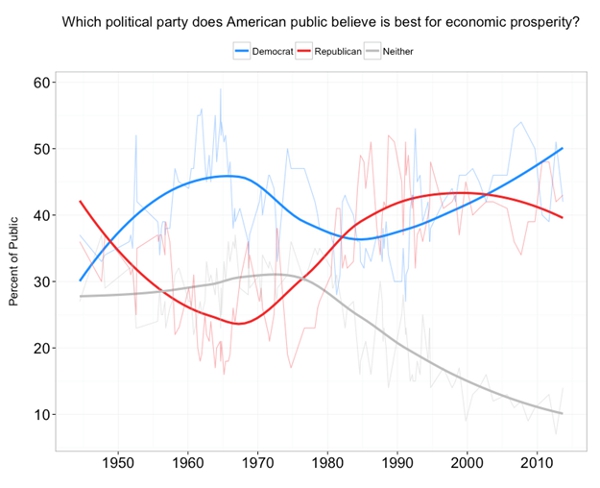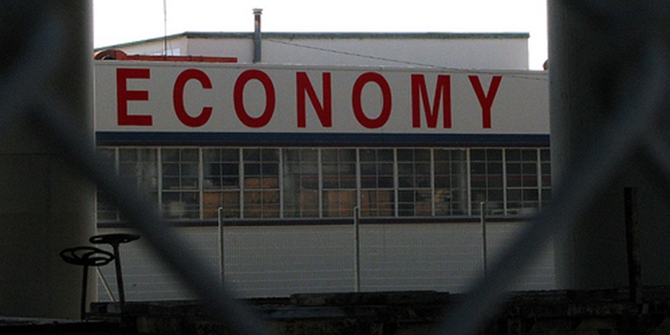 As of June 2015, the U.S. has experienced 63 consecutive months of private sector jobs growth, a result of what many commentators believe has been President Obama’s successful economic stewardship in the aftermath of the Great Recession. But will the Democratic Party benefit from Obama’s positive economic record? In new research which examines Americans’ attitudes towards the economic record of Republicans and Democrats from 1944 to 2013, Daniel Ponder, Christopher Simon, Dane Wendell, and Raymond Tatalovich find that the Democratic Party has benefited for decades in terms of public opinion from the way in which the Roosevelt Administration handled the Great Depression. With this in mind, they argue that Obama’s economic successes may lead to voters feeling positive about Democrats’ economic record for decades to come.
As of June 2015, the U.S. has experienced 63 consecutive months of private sector jobs growth, a result of what many commentators believe has been President Obama’s successful economic stewardship in the aftermath of the Great Recession. But will the Democratic Party benefit from Obama’s positive economic record? In new research which examines Americans’ attitudes towards the economic record of Republicans and Democrats from 1944 to 2013, Daniel Ponder, Christopher Simon, Dane Wendell, and Raymond Tatalovich find that the Democratic Party has benefited for decades in terms of public opinion from the way in which the Roosevelt Administration handled the Great Depression. With this in mind, they argue that Obama’s economic successes may lead to voters feeling positive about Democrats’ economic record for decades to come.
According to the latest government jobs report, employers added 280,000 jobs in May, continuing the trend of strong economic growth in the United States. The economist Justin Wolfers recently noted that the U.S. economy now has a record breaking 63 months of private sector jobs growth; the best since the mid-nineties.
The economy is not the only thing that has been growing lately. This summer is positively exploding with emerging presidential aspirants. As our thoughts turn towards the upcoming presidential election, we contemplate the question of which political party is thought by the public to be best stewards of economic prosperity. Will President Obama’s Democratic Party receive credit for successfully navigating the Great Recession? And, could any public praise transfer to Democratic presidential candidates in 2016? In new research, we find that the party’s positive economic performance during the Great Depression has helped to create an enduring public opinion advantage for the Democrats, one that may be being repeated in the wake of the Great Recession.
Party ownership of economic prosperity over time
“Issue ownership” is the public opinion advantage gained by a political party on a issue where the party has perceived expertise and achievement. Such advantages are typically the consequences of core, enduring party constituencies. For example, the well-known preponderance of teachers in the Democratic Party tends to reinforce the perception among many voters that the Democrats are highly effective on education issues. A history of support for strong security policy, Republicans typically have ownership over issues such as terrorism, military defense, and crime.
Does one party hold “ownership” over economic issues today? According to February 2015 Pew Research poll, Americans believe that the Republican Party is roughly as good as the Democratic Party at dealing with the economy. Currently, it appears that neither party has a net public opinion advantage on economic prosperity; but, the “issue ownership” of economic prosperity has changed significantly over time and across administrations.
Figure 1 – Public ratings of party performance on economic prosperity 1944 – 2013

Figure 1 above is an aggregation of Gallup polls from 1944 through 2013 on the question, “Which political party is better for economic prosperity?” The degree to which the public prefers Democrats or Republicans fluctuates significantly across time. Party identification is the best predictor for which party an individual thinks is better for the economy. In other words, Democrats are more likely give credit to the Democratic Party, and Republicans to the Republican Party. With the rise of an independent voting bloc, there has been a sharp decline in support in “ownership” for either party (grey line), while the trend indicates rising partisanship among those who identify with the major political parties.
What drives party ownership of economic prosperity?
Some political scientists conclude that party ownership of economic prosperity is a performance issue. Political scientist John Petrocik (1996) hypothesized that the American people credit and blame the party in charge for the current state of the economy. Patrick Egan’s very comprehensive look at issue ownership (2013) concluded that the economy is a performance issue according to his extensive polling data beginning in the 1970s.
Our research posits that large scale economic events may impact issue ownership for an entire generation of people. Voters who experienced FDR’s handling of the Great Depression might give the Democrats extra credit when it comes to massive government action to fix a badly wounded economy. The same might also be true for President Obama and a Democratic controlled Congress infusing nearly $800 billion into the US economy through the American Recovery and Rehabilitation Act of 2009.
In recent research, we use a program called WCALC, developed by University of North Carolina political scientist James Stimson, to derive trend data on 112 Gallup polls from 1944 to 2013. We employ a time series design to test a host of economic and political controls in trying explain variation in the percent of the public who chooses the Democrats as the party most able to handle economic prosperity. We indeed find that the legacy of the Great Depression looms large for generations who personally experienced those tough economic times, a legacy that lasts until the 1980s, when the issue begins to resemble a performance issue.
We find that higher unemployment helps Democrats (regardless of the party control), strongly suggesting that FDR’s successful management of unemployment during the Great Depression has created an enduring public opinion advantage for Democrats. Second, we find that Democrats had an enduring advantage as the party best for prosperity, beyond what economic performance indicators would predict prior to 1981. Finally, we find evidence that bad economic times under Republican presidents do not translate into greater public support for Democratic economic stewardship, raising questions about the performance issue thesis. The logic of this performance thesis is that bad economic times will penalize the party controlling the presidency and reward the opposition, but our analysis does not offer support to the performance thesis.
President Obama and the Great Recession: Forging new issue ownership?
Overall, our work finds evidence that voter opinion is influenced by party affiliation as well as seminal events in political and economic history. It would make logical sense, therefore, to conclude that Democrats will receive credit for their policies to end the Great Recession.
Surely the recent surge in job growth will be good for the Democrats moving into election season. However, should the American people (especially the younger generations today) decide that President Obama’s stewardship of the economy during the so-called Great Recession was remarkable; credit for today’s economy might go to Democrats for generations to come.
This article is based on the paper “Public Opinion and Democratic Party Ownership of Prosperity” in American Politics Research.
Featured image credit: Johnny Grim (Flickr, CC-BY -NC-ND-2.0)
Please read our comments policy before commenting.
Note: This article gives the views of the author, and not the position of USApp– American Politics and Policy, nor of the London School of Economics.
Shortened URL for this post: http://bit.ly/1IEVcbX
_________________________________________
 Daniel Ponder – Drury University
Daniel Ponder – Drury University
Daniel Ponder is L.E Meador Professor of Political Science at Drury University. His research focuses on American national institutions with special emphasis on the presidency. He is the author numerous articles and essays, and of Good Advice: Information and Policy Making in the White House (Texas A&M University Press, 2000). He is currently completing a book on presidential leverage.
 Christopher Simon – University of Utah
Christopher Simon – University of Utah
Christopher A. Simon is a Professor of Political Science at The University of Utah. He conducts research in alternative energy policy; civic community and volunteerism; education policy; criminal justice policy; Homeland Security policy; land use policy; public administration,[and military sociology. He is co-author of State and Local Government: Sustainability in the 21st Century (Oxford, 2011); Alternative Energy: Political, Economic, and Social Feasibility (Rowman & Littlefield, 2007); Public Policy: Preferences and Outcomes (Longman, 2007, 2010); and To Run a School: Administrative Organization and Learning (Praeger, 2001; Mandarin edition, 2005).
 Dane Wendell – Loyola University
Dane Wendell – Loyola University
Dane Wendell is a Ph.D. Candidate of Political Science at Loyola University Chicago. He will be a Visiting Assistant Professor of Political Science at Rhodes College starting fall 2015. He studies political cognition, neuropolitics, and the emotion of disgust.
 Raymond Tatalovich – Loyola University
Raymond Tatalovich – Loyola University
Raymond Tatalovich is a Professor of American Politics in the Department of Political Science at Loyola University. His teaching and research interests include the American government, the presidency and executive branch, public policy analysis with an emphasis on moral conflicts, and Congress as well as Canadian Politics. His three co-edited books include Moral Controversies in American Politics (2011).




2 Comments